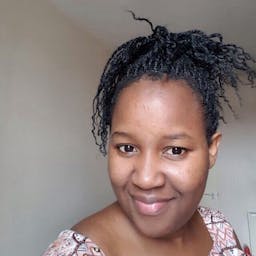Inspiration from my Granny
May 28, 2019
Story
When granny was a teenager (probably around 12 or 14), a marriage was arranged for her with her first husband. A colourful Fullah wedding was thrown for them. In the third year of the marriage, and after her second child was born, Granny's husband went on a business trip to Liberia and never returned.
That was a period when cannibalism was popular in the manor river belt. Granny believed he was murdered. Granny wished to mourn her beloved husband for many planting and harvesting seasons but this was not culture demanded. It was uncultured for a Fullah woman to stay unmarried after the four month and ten days traditional mourning period. Granny who was the only daughter to her Father, soon had her second marriage arranged to my Grandpa.
Granny would explain about her second marriage; 'I didn't love him. I didn't see him as my husband. He was imposed on me. I only endured that marriage because at the time I didn't have an option'. Besides, it is a grave disrespect for a girl to contest the choice of husband made by her parents. Any attempt could have led to severe beatings or even disownment by Granny's parents.
However, after the death of my great grand father (Granny's father), Granny quit the marriage with my Grandpa. She could not bare it anymore. Her father left behind a thriving business which Granny took over as an independent woman.
From time to time, Granny would explain some of the abuses she suffered from Grandpa; emotional and physical. Grandpa had about seven other wives. Some of the abuses include beatings and general neglect. No woman want to be in a marriage wherein she is not even a second best. It was because of this that Granny left to becoming an independent woman until she passed;over sixty yearslater.
Granny didn't get any formal education. She didn't know how to read or write the English language. She was well grounded in Islamic knowledge and the quran. Granny didn't know or perhaps even heard the word 'empowerment' until her death. But the theme of empowerment was in every words she said as she narrated her story to us her grand children. She used words like 'free', 'relieved', 'glad' and 'peace'. She felt empowered when she quit her marriage to Grandpa.
Granny took along her six children whom she cared for as a lone parent with occasional support from Grandpa. Because she had a business to sustain her, Granny was strong enough to walk away knowing the marriage she was in was disempowering.
Today, child marriage, arrange marriage and forced marriage are still popular in many cultures in Sierra Leone as the country is ranked 15th in country's with the highest percentage of child marriage, with 44% of women and girls getting married before the legally required age of 18.
Even with the launching this week of the anti-child marriage campaign in the country, there are doubts over political and communal commitment to end it. Albeit the law states that a woman must be 18 years before getting married, poverty and traditions that require upholding the virginity of girls before marriage have forced parents to give their children hand in marriage to men sometimes old enough to be their Fathers.
A 2014 world bank report states that girls with little or no education are more likely to be married as children, live in poverty, lack a say over household spending and are more likely to suffer domestic violence like Granny did.
The world bank report also notes that 65% of women with primary education or less globally are married as children. Granny never attained education. The report reveals that in 18 of the 20 countries with highest prevalence of child marriage (including Sierra Leone), girls with no education were six times more likely to be married as children than those who attain high school education.
Granny's story inspires me in a very special way. I feel I owe my enthusiasm to change the world around me to my Granny. As a single mother, Granny went on to become a women's leader (Mammy Queen), educate some of her children, teach others business skills and champion a lot of other projects in her community in Kabala, Northern Sierra Leone that helped transformed women's lives.
Whenever I face challenges in my resolve to change the world around me, I always think about Granny, her story, her advice, her encouragements to reach for the sky and her support for us her grand children to pursue our dreams. Granny had far less resources than I have today. If she could do it then, surely I can do it now. My Granny is my inspiration. Thanks to her.




